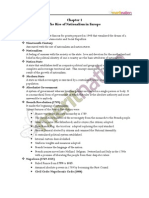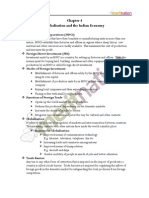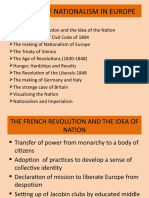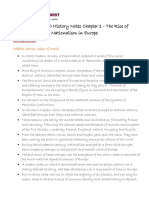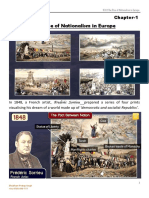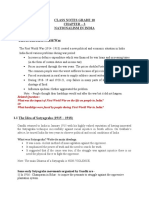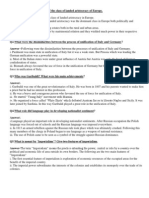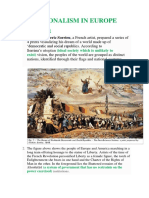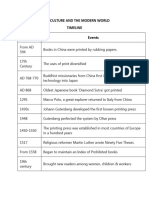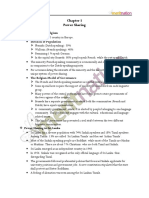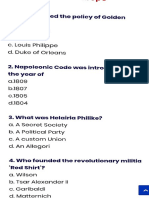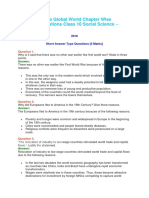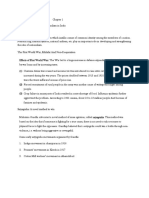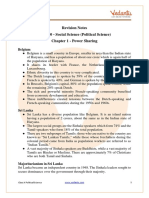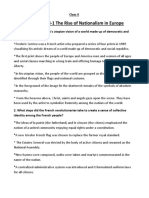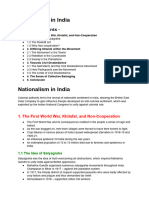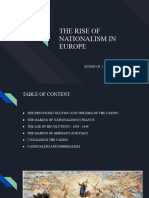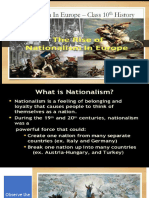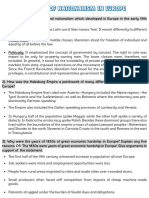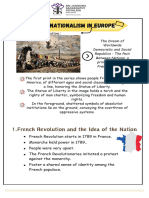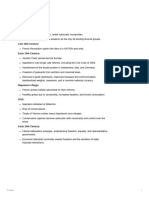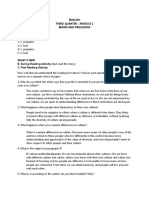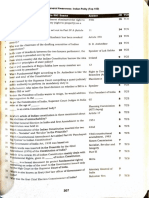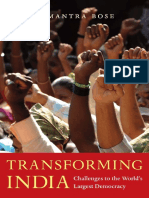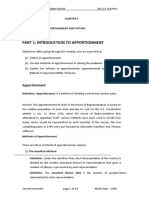0 ratings0% found this document useful (0 votes)
2K viewsCBSE Class 10 History Notes Chapter 1
CBSE Class 10 History Notes Chapter 1
Uploaded by
Sachin PalThe document summarizes the rise of nationalism in Europe in the 19th century. As different Slavic groups struggled to define their identities and independence in the Balkans region, tensions increased between nationalist groups. This led to a series of conflicts and wars in the Balkans and ultimately contributed to the start of World War I. After defeating Napoleon in 1815, European governments adopted conservative ideologies focused on preserving traditional institutions like monarchy and the church. Representatives of European powers met at the Congress of Vienna to establish a post-Napoleon settlement restoring monarchies and implementing conservative regimes with authoritarian controls and censorship.
Copyright:
© All Rights Reserved
Available Formats
Download as PDF, TXT or read online from Scribd
CBSE Class 10 History Notes Chapter 1
CBSE Class 10 History Notes Chapter 1
Uploaded by
Sachin Pal0 ratings0% found this document useful (0 votes)
2K views1 pageThe document summarizes the rise of nationalism in Europe in the 19th century. As different Slavic groups struggled to define their identities and independence in the Balkans region, tensions increased between nationalist groups. This led to a series of conflicts and wars in the Balkans and ultimately contributed to the start of World War I. After defeating Napoleon in 1815, European governments adopted conservative ideologies focused on preserving traditional institutions like monarchy and the church. Representatives of European powers met at the Congress of Vienna to establish a post-Napoleon settlement restoring monarchies and implementing conservative regimes with authoritarian controls and censorship.
Original Description:
Class 10
Original Title
CBSE-Class-10-History-Notes-Chapter-1
Copyright
© © All Rights Reserved
Available Formats
PDF, TXT or read online from Scribd
Share this document
Did you find this document useful?
Is this content inappropriate?
The document summarizes the rise of nationalism in Europe in the 19th century. As different Slavic groups struggled to define their identities and independence in the Balkans region, tensions increased between nationalist groups. This led to a series of conflicts and wars in the Balkans and ultimately contributed to the start of World War I. After defeating Napoleon in 1815, European governments adopted conservative ideologies focused on preserving traditional institutions like monarchy and the church. Representatives of European powers met at the Congress of Vienna to establish a post-Napoleon settlement restoring monarchies and implementing conservative regimes with authoritarian controls and censorship.
Copyright:
© All Rights Reserved
Available Formats
Download as PDF, TXT or read online from Scribd
Download as pdf or txt
0 ratings0% found this document useful (0 votes)
2K views1 pageCBSE Class 10 History Notes Chapter 1
CBSE Class 10 History Notes Chapter 1
Uploaded by
Sachin PalThe document summarizes the rise of nationalism in Europe in the 19th century. As different Slavic groups struggled to define their identities and independence in the Balkans region, tensions increased between nationalist groups. This led to a series of conflicts and wars in the Balkans and ultimately contributed to the start of World War I. After defeating Napoleon in 1815, European governments adopted conservative ideologies focused on preserving traditional institutions like monarchy and the church. Representatives of European powers met at the Congress of Vienna to establish a post-Napoleon settlement restoring monarchies and implementing conservative regimes with authoritarian controls and censorship.
Copyright:
© All Rights Reserved
Available Formats
Download as PDF, TXT or read online from Scribd
Download as pdf or txt
You are on page 1of 1
�Deeksha
Chapter 1- The Rise of Nationalism in Europe
Nationalism and Imperialism
Idealistic liberal democratic sentiments because of a narrow creed with limited ends.
Nationalist groups became increasingly intolerant of each other and ever ready to go to war.
- After 1871 nationalist tension mounted in Europe in the area called Balkan’s. The
Balkans was a region of geographical and ethnic variations.
- A large part of Balkans was under the contral of the ottoman Empire.
- The spread of the ideas of romantic nationalism in the Balkans and downfall of Otto-
man Empire made this region very explosive.
- As the different Slavic nationalist struggled to define their identity and independence,
the Balkans became an area of conflict.
- There was intense rivalry among the European powers over trade and colonies.
- This led to a series of wars in the region and finally the first world war.
- Many countries in the world which had been colonized by the European powers in the
19th century began to oppose imperial domination.
- The anti-imperial movements developed nationalism and formed independent nation-
states.
A New Conservatism after 1815
- After the defeat of Napoleon in 1815 European govts were driven by the spirit of
conservatism.
- Conservatives believed in traditional institutions of state & society like the monarchy,
the church, social hierarchies, property and the family be preserved.
- In 1815 representatives of the European powers. Britain, Russia, Prussia and Austria
who had collectively defeated Napoleon met at Vienna to draw up a settlement for
Europe.
- The treaty of Vienna of 1815. The Bourbon dynasty which had been deposed after the
French revolution was restored to power.
- Conservative regimes set up in 1815 were autocratic. They did not tolerate criticism
and sought to curb the activities.
- Most of them imposed censorship laws to control newspapers, books plays and songs
and reflected ideas of liberty and freedom.
Questions :
1. Why did Nationalist conflict rise in the Balkans?
2. Describe the rise of Nationalism in the third phase of 19th century in Europe.
3. What do you understand by the term conservatism?
4. When was Napoleon defeated and who defeated him?
5. Explain the treaty of Vienna what were its objectives?
6. What type of conservative order existed in Europe in 1815?
34
Nurturing Success of Every Child https://deekshalearning.com
You might also like
- Detlev Peukert - The Weimar Republic - The Crisis of Classical Modernity - Libgen - LiDocument364 pagesDetlev Peukert - The Weimar Republic - The Crisis of Classical Modernity - Libgen - LiMsq JuliaNo ratings yet
- Why Alliances Endure or CollapseDocument25 pagesWhy Alliances Endure or CollapseSafdar HussainNo ratings yet
- The Rise of Nationalism in EuropeDocument8 pagesThe Rise of Nationalism in EuropeAviral Agarwal74% (31)
- Laura Gamboa - Resisting Backsliding - Opposition Strategies Against The Erosion of Democracy-Cambridge University Press (2022)Document327 pagesLaura Gamboa - Resisting Backsliding - Opposition Strategies Against The Erosion of Democracy-Cambridge University Press (2022)EdisonReatiquiNo ratings yet
- Lesson No. 1 Rise of Nationalism in EuropeDocument8 pagesLesson No. 1 Rise of Nationalism in EuropeG Abhi Sheethi100% (1)
- The Rise of Nationalism in EuropeDocument23 pagesThe Rise of Nationalism in EuropeNikhil Kumar 176% (21)
- Globalisation and The Indian EconomyDocument2 pagesGlobalisation and The Indian Economymaniscrbd100% (2)
- Rise of Nationalism in EuropeDocument20 pagesRise of Nationalism in EuropeSuneetha Chowdary100% (2)
- CL-10 The Rise of Nationalism in EuropeDocument17 pagesCL-10 The Rise of Nationalism in EuropeHarsh80% (5)
- Class 10 History Ch-1 Notes and AssignmentDocument5 pagesClass 10 History Ch-1 Notes and AssignmentYusuf Shaharyar100% (2)
- Rise of Nationalism in EuropeDocument17 pagesRise of Nationalism in EuropeHarshit kumar SinhaNo ratings yet
- Notes-History Class 10 Chapter 1 - The Rise of Nationalism in EuropeDocument12 pagesNotes-History Class 10 Chapter 1 - The Rise of Nationalism in EuropeMANISH JOSHINo ratings yet
- CBSE Class 10 History Notes Chapter 1 - The Rise of Nationalism in EuropeDocument9 pagesCBSE Class 10 History Notes Chapter 1 - The Rise of Nationalism in Europeshashikant kumar100% (1)
- The Rise of Nationalism in Europe - 01Document52 pagesThe Rise of Nationalism in Europe - 01Megh PanchalNo ratings yet
- The Rise of Nationalism in Europe PPT For ExplanationDocument34 pagesThe Rise of Nationalism in Europe PPT For ExplanationYash WarkeNo ratings yet
- Rise of Nationalism in EuropeDocument12 pagesRise of Nationalism in EuropeMilan Patel100% (1)
- Class 10 SA-1 Making of A Global World NotesDocument10 pagesClass 10 SA-1 Making of A Global World NotesSujitnkbps50% (12)
- Class 10 SA-1 Power Sharing NotesDocument5 pagesClass 10 SA-1 Power Sharing NotesSujitnkbps100% (2)
- The Rise of Nationalism in Europe 1655374808006Document90 pagesThe Rise of Nationalism in Europe 1655374808006Bajarangi Bhaiya100% (2)
- 10.H.1 The Rise of Nationalism in EuropeDocument10 pages10.H.1 The Rise of Nationalism in EuropeAashna100% (1)
- Power Sharing Notes With PYQDocument22 pagesPower Sharing Notes With PYQSANDHYA KUMARI100% (1)
- Class Notes Grade 10 Chapter - 3 Nationalism in IndiaDocument4 pagesClass Notes Grade 10 Chapter - 3 Nationalism in Indiabhavesh gupta100% (1)
- Explain Any Three Features of The Class of Landed Aristocracy of EuropeDocument8 pagesExplain Any Three Features of The Class of Landed Aristocracy of EuropeTapas Banerjee83% (6)
- Class 10 History Chapter 1 Notes DownloadDocument13 pagesClass 10 History Chapter 1 Notes DownloadTech GURU100% (1)
- Nationalism in India PDFDocument50 pagesNationalism in India PDFAshwin .R100% (2)
- Class 10 SA-1 Print Culture and The Modern World NotesDocument7 pagesClass 10 SA-1 Print Culture and The Modern World NotesSujitnkbps95% (19)
- Nationalism in EuropeDocument27 pagesNationalism in EuropeMD SOHRAB100% (1)
- CBSE Class 10 History Notes Chapter 3 - The Making of A Global WorldDocument8 pagesCBSE Class 10 History Notes Chapter 3 - The Making of A Global WorldGitika Das67% (3)
- Class 10th - Civics - Power Sharing - One Shot - Chapter ExplanationDocument28 pagesClass 10th - Civics - Power Sharing - One Shot - Chapter ExplanationNeeyati Bhardwaj100% (2)
- GR10 - Print Culture TimelineDocument4 pagesGR10 - Print Culture Timelinealthafunderscorea11No ratings yet
- (Chapter 1) - Power SharingDocument31 pages(Chapter 1) - Power SharingSoham Shinde0% (1)
- Print Culture and The Modern WorldDocument73 pagesPrint Culture and The Modern WorldSimmi Grover100% (1)
- Summary.A Triumph of Surgery PDFDocument1 pageSummary.A Triumph of Surgery PDFYash Saxena100% (1)
- Power SharingDocument2 pagesPower SharingSubhashini ShanmugamNo ratings yet
- Print Culture and Modern World - HistoryDocument6 pagesPrint Culture and Modern World - HistoryYashaswi GargNo ratings yet
- CBSE Class 10 SST Notes Question Bank The Rise of Nationalism in EuropeDocument9 pagesCBSE Class 10 SST Notes Question Bank The Rise of Nationalism in EuropeRia Saigal100% (2)
- Power Sharing Notes by Gaurav SutharDocument19 pagesPower Sharing Notes by Gaurav Sutharamitkumary217100% (1)
- SST Project On Rise of Nationalism in Europe by Pratyush ThakurDocument24 pagesSST Project On Rise of Nationalism in Europe by Pratyush ThakurPratyush Thakur55% (11)
- 4 The Making of A Global WorldDocument5 pages4 The Making of A Global WorldSubhash Yadav100% (2)
- Outcomes of DemocracyDocument20 pagesOutcomes of DemocracyMESHWI PATELNo ratings yet
- Class 10 History Important DatesDocument4 pagesClass 10 History Important Datessahritesh630No ratings yet
- SST Class 10th Pareodic Test 1 Important Questions by Digraj SirDocument71 pagesSST Class 10th Pareodic Test 1 Important Questions by Digraj Sirjayveer7511No ratings yet
- The Rise of Nationalism in Europe Notes With PYQDocument29 pagesThe Rise of Nationalism in Europe Notes With PYQRiya100% (1)
- MCQ - Nationalism in EuropeDocument6 pagesMCQ - Nationalism in EuropePiyush KalaNo ratings yet
- The Making of A Global World Chapter Wise Important Questions Class 10 Social Science PDFDocument9 pagesThe Making of A Global World Chapter Wise Important Questions Class 10 Social Science PDFSomik JainNo ratings yet
- GX-His - Ch3 NATIONALISM IN INDIA-FINAL Notes-1Document10 pagesGX-His - Ch3 NATIONALISM IN INDIA-FINAL Notes-1Sonia0% (1)
- 3.nationalism in India GCDocument8 pages3.nationalism in India GCshalini 13No ratings yet
- Class 10 History Timeline Shobhit NirwanDocument19 pagesClass 10 History Timeline Shobhit Nirwanrakesh singh86% (7)
- CBSE Class 10 Political Science (Civics) Chapter 1 Notes - Power SharingDocument4 pagesCBSE Class 10 Political Science (Civics) Chapter 1 Notes - Power Sharinggyu :No ratings yet
- History - X-Nationalism in EuropeDocument10 pagesHistory - X-Nationalism in EuropeAnusha SinghalNo ratings yet
- Electoral Politics Notes Class 9Document6 pagesElectoral Politics Notes Class 9nandita singh100% (2)
- The Rise of Nationalism in Europe - Exam PackDocument40 pagesThe Rise of Nationalism in Europe - Exam PackSAHIL KUMAWAT100% (1)
- Class 10 Geo. CH 1 - Resource and Development NotesDocument13 pagesClass 10 Geo. CH 1 - Resource and Development Notessadhna yadav100% (3)
- 2611 Topper 21 101 2 21 7342 The Rise of Nationalism in Europe Up201601150914 1452829457 5763Document5 pages2611 Topper 21 101 2 21 7342 The Rise of Nationalism in Europe Up201601150914 1452829457 5763ARCHANNAA50% (2)
- History Ch-1 Rise of Nationalism in Europe NotesDocument15 pagesHistory Ch-1 Rise of Nationalism in Europe NotesSonia100% (1)
- CBSE Notes Class 10 History Chapter 2 Nationalism in IndiaDocument9 pagesCBSE Notes Class 10 History Chapter 2 Nationalism in IndiaStl 47100% (1)
- Class 10 Social Sciences Geography: Chapter 1 Notes Resources and Development 1. ResourcesDocument8 pagesClass 10 Social Sciences Geography: Chapter 1 Notes Resources and Development 1. ResourcesSandhya SinghNo ratings yet
- Rise of Nationalism in EuropeDocument41 pagesRise of Nationalism in Europecome2sandhya100% (1)
- Class-10 - History Ch-1 - Nationalism in Europe RevisedDocument42 pagesClass-10 - History Ch-1 - Nationalism in Europe RevisedRenu RawatNo ratings yet
- The Rise of Nationalism in EuropeDocument5 pagesThe Rise of Nationalism in EuropeM. BNo ratings yet
- .Nationalism in Europe PDFDocument13 pages.Nationalism in Europe PDFakshayasankar156No ratings yet
- Nationalism in Europe - TimelineDocument3 pagesNationalism in Europe - Timelinescratchcoder1No ratings yet
- CBSE Class 10 History Chapter 1 NotesDocument4 pagesCBSE Class 10 History Chapter 1 NotesBiplab HalderNo ratings yet
- English Elective SrSec 2022-23Document10 pagesEnglish Elective SrSec 2022-23Sachin PalNo ratings yet
- Meaning, Scope and Importance of Statistics II Notes II VikashDocument6 pagesMeaning, Scope and Importance of Statistics II Notes II VikashSachin Pal100% (8)
- Class 12 Micro Economics Chapter 2 - Revision NotesDocument23 pagesClass 12 Micro Economics Chapter 2 - Revision NotesSachin PalNo ratings yet
- Class XI CommerceDocument2 pagesClass XI CommerceSachin PalNo ratings yet
- CBSE Syllabus For Class 11 Economics 2022-23 (Revised) PDF DownloadDocument5 pagesCBSE Syllabus For Class 11 Economics 2022-23 (Revised) PDF DownloadSachin PalNo ratings yet
- CBSE Class 11 Business Studies SyllabusDocument9 pagesCBSE Class 11 Business Studies SyllabusSachin PalNo ratings yet
- Class 11 Business Studies Chapter 2 - Revision NotesDocument11 pagesClass 11 Business Studies Chapter 2 - Revision NotesSachin PalNo ratings yet
- Track and Field Constitution 2021-2022 1Document7 pagesTrack and Field Constitution 2021-2022 1api-610935042No ratings yet
- Mumbai Municipal Elections Analysis of Criminal Financial Background of CandidatesDocument227 pagesMumbai Municipal Elections Analysis of Criminal Financial Background of CandidatesRealityviewsNo ratings yet
- FLORENTINO vs. FLORENTINODocument3 pagesFLORENTINO vs. FLORENTINOLj BinuaNo ratings yet
- Live Music Festival Tulum SunsetDocument2 pagesLive Music Festival Tulum SunsetAle AvaNo ratings yet
- Module 2-Q3-Bias and PrejudicesDocument5 pagesModule 2-Q3-Bias and PrejudicesEdilbert Bonifacio GayoNo ratings yet
- Introductions As Session Begins: Chairperson ScriptDocument4 pagesIntroductions As Session Begins: Chairperson ScriptNainshree JoshiNo ratings yet
- Student Example For Jewsish Refugee DBQ EssayDocument7 pagesStudent Example For Jewsish Refugee DBQ EssayRushi PatelNo ratings yet
- Chairperson and Time Keeper Text GuideDocument1 pageChairperson and Time Keeper Text GuideOla HasanNo ratings yet
- Interest Groups Webquest: Source: Official Website or WikipediaDocument4 pagesInterest Groups Webquest: Source: Official Website or WikipediaJakari DavisNo ratings yet
- PolityDocument5 pagesPolityYashwant Singh RathoreNo ratings yet
- Donald TrumpDocument104 pagesDonald TrumpDana Jamal100% (1)
- 第三届"汉语桥"世界小学生中文秀罗马尼亚赛区决赛暨布大孔院儿童班结业仪式 中英文主持词6.15Document7 pages第三届"汉语桥"世界小学生中文秀罗马尼亚赛区决赛暨布大孔院儿童班结业仪式 中英文主持词6.15曹瑞红No ratings yet
- List of Applicants of HF Luxury Apartments Scheme Kda Scheme-33, Gulzar-E-Hijri, KarachiDocument3 pagesList of Applicants of HF Luxury Apartments Scheme Kda Scheme-33, Gulzar-E-Hijri, KarachiFarheen ZaidiNo ratings yet
- Nationalism - Life and Works of RizalDocument1 pageNationalism - Life and Works of RizalKratos of SpartaNo ratings yet
- Supreme Court of India Page 1 of 11Document11 pagesSupreme Court of India Page 1 of 11Saransh BhardwajNo ratings yet
- Group 6 - Elections in The Internet AgeDocument24 pagesGroup 6 - Elections in The Internet Agemarvinbarrameda09No ratings yet
- Starkville Dispatch Eedition 1-22-21Document16 pagesStarkville Dispatch Eedition 1-22-21The DispatchNo ratings yet
- BPCL Bulk Bitumen Prices 2022 IGDocument1 pageBPCL Bulk Bitumen Prices 2022 IGAssistant Director KHRINo ratings yet
- Khedive Tawfik & Urabi RevolutionDocument13 pagesKhedive Tawfik & Urabi RevolutionHanin AlaaNo ratings yet
- Good Governance, Misgovernance and Three Scanarios For The Future of Open Balkan - Berlin Process RelationshipDocument25 pagesGood Governance, Misgovernance and Three Scanarios For The Future of Open Balkan - Berlin Process RelationshipvlaskovicivanaposlicNo ratings yet
- Predicting The ElectionDocument6 pagesPredicting The ElectionHANNAH GODBEHERENo ratings yet
- Transforming India - Challenges To The World's Largest DemocracyDocument349 pagesTransforming India - Challenges To The World's Largest DemocracySudhanshu SaxenaNo ratings yet
- PG 2ndsem Locational Significance On India by Dr. Bharati GogoiDocument7 pagesPG 2ndsem Locational Significance On India by Dr. Bharati Gogoifictional worldNo ratings yet
- Apportionment and VotingDocument24 pagesApportionment and VotingMa Gemma ApaapNo ratings yet
- Naval v. Commission On Elections, 729 SCRA 299 (2014)Document22 pagesNaval v. Commission On Elections, 729 SCRA 299 (2014)Madara UchihaNo ratings yet
- Class 10 The President NotesDocument4 pagesClass 10 The President Notessheikhmohammed539No ratings yet
- STRIVE Programme Comm #1Document3 pagesSTRIVE Programme Comm #1aida mohd tahirNo ratings yet


